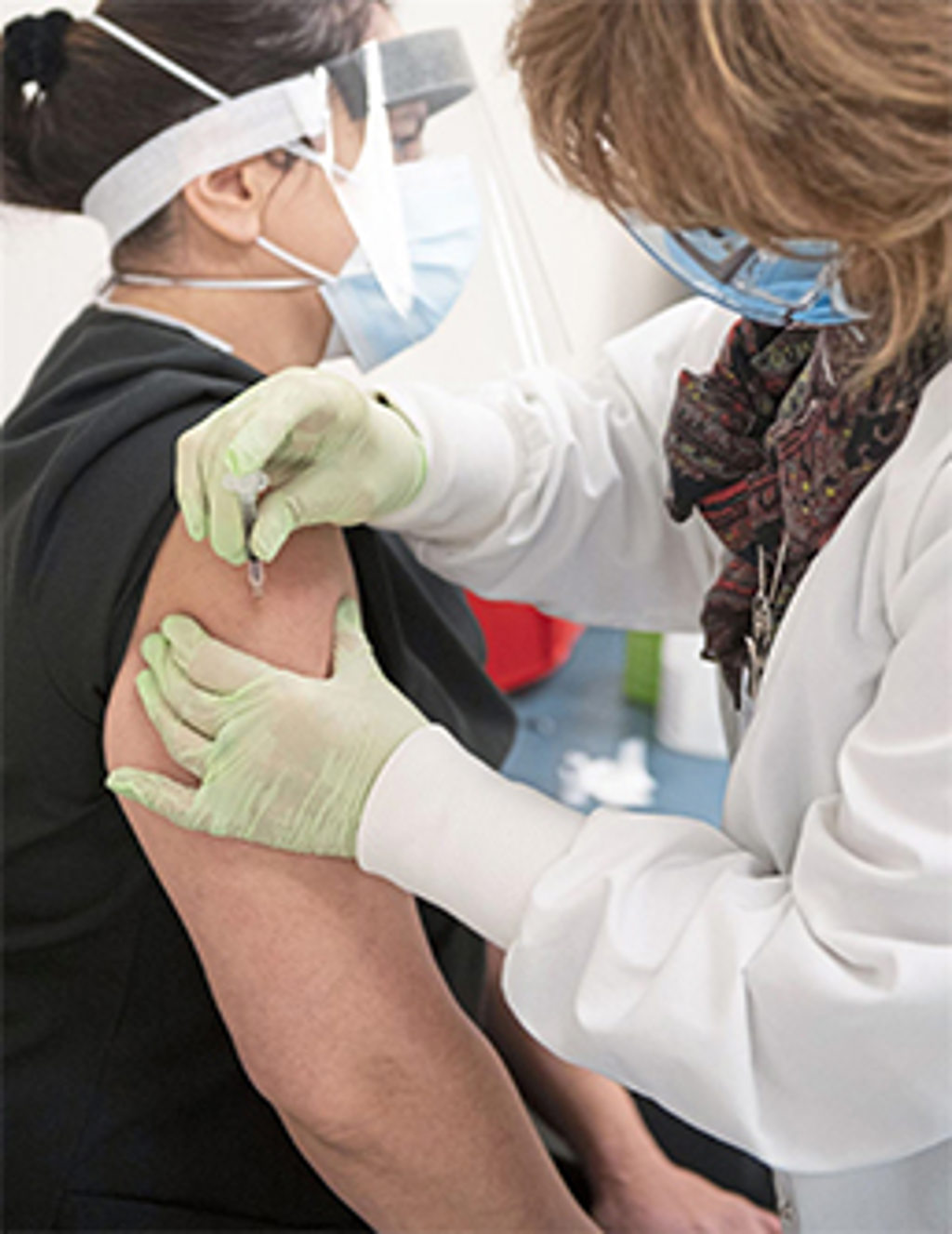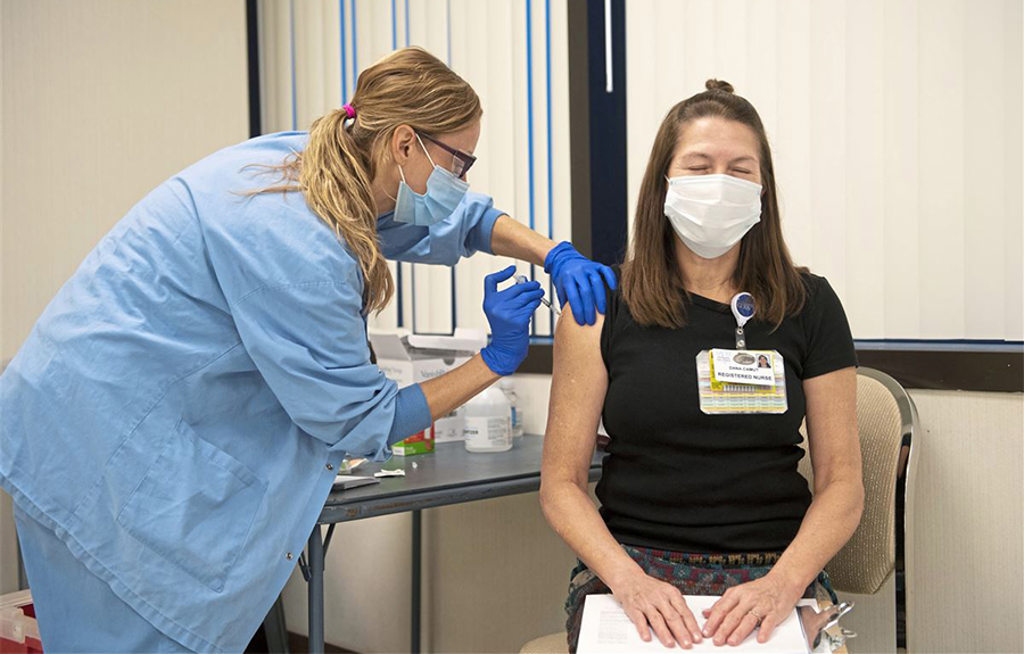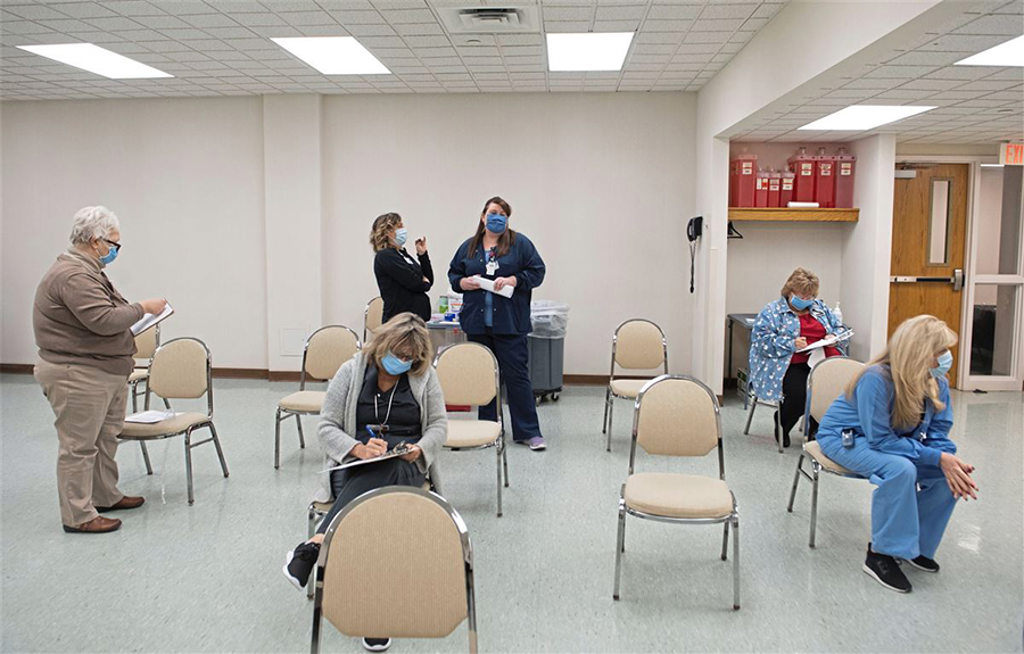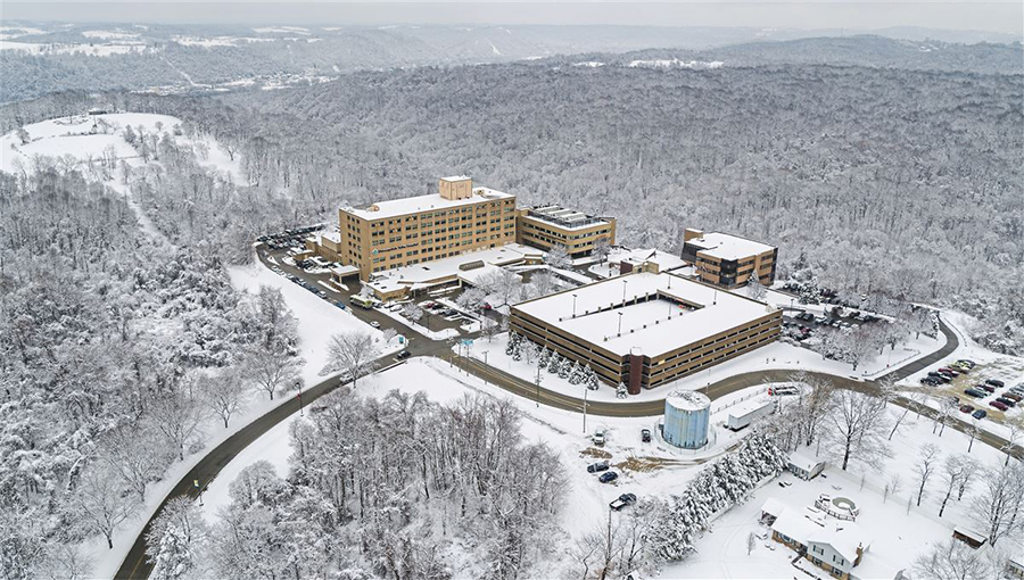Mon Valley Hospital joins the big shots in being among the first to administer the COVID-19 vaccine
In the spacious room where Monongahela Valley Hospital medical workers would normally gather for their annual holiday bash, they instead slipped into a metal chair, rolled up their sleeves, and received a powerful dose created to protect them from a virus that has ravaged their hospital and left many of their patients dead.
Nestled amid the old steel and manufacturing towns south of Pittsburgh, the 200-bed community facility became an unexpected recipient of some of the first vaccines to be given in Pennsylvania, sharing the stage with medical juggernauts across the country.
For Lynda Nester, a career nurse who was among the workers at the Washington County hospital to receive the shot Wednesday, it was a heartfelt moment not just for her, but the hundreds of fellow workers who have labored there as the pandemic raged inside.
"It really makes me feel like I'm being a part of something, I wish I could find words for this. Hope, I guess that's what I would say," said the 68-year-old cancer survivor and executive director for the hospital's Community Care Network, which sends social workers into the homes of discharged patients.
The independent medical facility atop what locals call "hospital hill" in Carroll Township -- population 5,600 -- joined UPMC as the only two hospitals of the 87 approved statewide to receive the Pfizer- BioNTech vaccine on the first day of delivery.
For the past several days, workers filed into the conference center where they were met by colleagues poking them with the single doses. Some were nervous; others relieved. Still others were concerned about the virus-stricken patients they were treating in the emergency and hospital rooms.


Tara Perry, a registered nurse, finished her 12-hour shift on the critical care unit Wednesday morning but stopped by to get her shot before heading home to sleep and help her 7-year-old daughter, Emma, with online school work. "We've had 40 to 50 COVID patients in the hospital over the last week," said Ms. Perry, 43, of Belle Vernon. "I've been trying to kind of separate everything. I have my rituals when I get home where I change clothes, hurry up and shower. It's hard when you have kids -- ‘Don't hug mummy. I have to get a shower.' I try not to talk as much about everything once I'm home.
"I try to live a normal life. But you're constantly worrying if you're going to bring it home to your family. I can only do so much to protect everyone. That's why this vaccine is really important."
The general acute care facility not only takes in patients from Monongahela, usually called "Mon City," population 4,300, but also from its neighbors along the river that shares its name -- Belle Vernon, California, Charleroi, Donora, Monessen and others -- where the Allegheny, Washington and Westmoreland county borders converge.
The storied towns are shells of what they once were. While the steel mills are long gone from Donora and Allenport and with most manufacturing leaving Charleroi -- along with its historic movie theaters and department stores -- a 45-acre coke plant still keeps its 56 ovens running in Monessen.
Though the town's economic heyday might have passed, Mon Valley Hospital remains an integral part of the local business landscape. Its milestone moment in medical history began early Dec. 13, with a flurry of emails between hospital leaders when they got word the vaccine was to arrive the next day.
That's when Margaret Brown, the hospital's pharmacy director, received Pfizer's shipment of 975 doses. Ms. Brown unpacked it from the dry ice and promptly put the small, flat box, which she described as a "personal pan Pizza Hut"-size box, in the hospital's single cold chest freezer, called the "bone freezer" -- ranging from -60 to -80 degrees Celsius.
The team thawed the doses in stages Wednesday through Friday to vaccinate any of its 1,300 staff members who come into contact with COVID patients, as well as anyone else working on the premises who wanted it -- doctors, nurses, cleaners, EMTs and even the township police officers who have a substation in the emergency department.
Unlike other hospitals that might have to make the fateful decisions of who gets the vaccine now -- and who doesn't -- Mon Valley will have enough for most of the workers who have raised their arms.
The Centers for Disease Control and Prevention's immunization advisory panel recommends that health care workers get the shots first, followed by at-risk populations and those 65 and older -- though states can tweak that guidance.
By 11 a.m. Friday, Mon Valley had administered 671 doses.
Dr. Ronald Lutes, a nephrologist there, wanted to shatter any fears.
After stepping forward to get one of the first shots, Dr. Lutes said the employees could "see that I got the vaccine and survived."
Since March, Dr. Lutes, who also is chairman of Pharmacy & Therapeutics, said he has helped to care for the hospital's COVID-19 patients -- a feat that has tested him time and again.
He said he has watched people in their 30s and 40s hooked to ventilators for weeks, and in some cases, shut down. "We're sitting here with people as they're dying, their family members can't come in. We're sitting there being compassionate and holding their hands."
The hospital has seen 888 total COVID-19 cases, from critical inpatients to mild outpatients, and 20 deaths. As of Friday, the facility's eight ICU beds were filled with COVID patients, and some were on ventilators. The administration declined to disclose how many staffers had contracted the virus. None of them has died.
Employees credit the hospital's leaders -- whom many refer to as "family" -- for moving quickly with the Pennsylvania Department of Health when providers began to submit applications to receive the vaccine in October.
Out of roughly 200 hospitals statewide, 87 met the criteria to get the vaccine. At that point, according to the health department, the CDC and Pfizer carved out the timeline to deliver initial batches of vaccine to each of the approved hospitals. Most of them will get the minimum number of doses -- 975 -- though some, such as UPMC Presbyterian and Doylestown Hospital in Bucks County, are getting a double batch.
A bit of mystery cloaks the process by which the delivery timetable was fashioned. Several hospital officials in the region said they had no idea how their facilities were chosen to receive shipments on a particular day. The state health department assigned responsibility for developing the delivery schedule to the CDC and Pfizer. And the CDC did not respond to a media inquiry.
The contrast of UPMC and Mon Valley -- the two hospitals that led the way -- is striking. UPMC, the largest private employer in Pennsylvania, is a $21 billion behemoth with 40 hospitals, 8,400 beds, and more than 90,000 employees. Mon Valley is a single, independent facility that can care for less than 5 percent of UPMC's total patient load.
And yet, both are seen as crucial at this turning point in the pandemic.
"And to think, this little Western Pennsylvania hospital, we're right up there with UPMC being one of the first ones to get it," said Ms. Nester, of Monongahela. "I mean we really were thinking, ‘When are we going to get it?' Boy, it was approved, and it was here."

Donna Ramusivich, Mon Valley's senior vice president, said in the early crush of the pandemic, there was a shortage of masks, gowns and other personal protective equipment. The administration eventually received donations, followed by a grant to buy three ventilators. Closing elective surgeries meant taking "a huge financial hit."
And then there were those heart-wrenching moments. One of the first critical COVID-19 patients to end up in Mon Valley's ICU in the spring was a man from Haiti.
Staff had to arrange a call with his family members on the French-speaking Caribbean island.
"We were talking a different language. We had to have that all set up, there was an interpreter on the line. His family was able to see him and be with him in his final moments. It takes an emotional toll on the staff. They do go through the Zoom calls and FaceTime," Ms. Ramusivich said. "That can be challenging at times — not all family members have the technological capabilities."
The hospital, like most around the nation, is facing another hurdle -- this one being "the largest surge we've faced of this pandemic to date," she said.
Because of the number of cases, the hospital was forced to restrict visitors in November.
"With the amount of community spread that's happening, we've had some employees get it from family members, and we're dealing with staff shortages just like all of the other hospitals," she said.
In the weeks leading up to the vaccine, hospital leaders mounted an aggressive education campaign promoting inoculation. Dr. Lutes and four other physicians appeared on vaccine campaign posters displayed around the hospital in recent weeks with messages like "Roll up your sleeve" and "Be a health care hero."
Despite the outreach, some staffers decided not to get the shot. The administration left it up to individuals to decide, but they're "counting every dose" so that none is wasted.
Hospital officials could not provide an exact percentage of workers who received it. But President and CEO Lou Panza was one.
On Monday, Mon Valley staff will ferry the vaccine two miles to its 84-bed long-term care facility, the Residences at the Hilltop.
"Our plan is by Christmas Day, all of our vaccines will have been administered," Ms. Brown said. The next round of the two-dose regimen is expected to arrive Jan. 4.
With Mon Valley staff already inoculating their workforce, other area hospital leaders were still waiting midweek for their first shipments to arrive as a nor'easter bore down on the East Coast. Despite the snowfall, the health department said no shipments were delayed. Excela Health, with three hospitals in Westmoreland County, and Allegheny Health Network, which has eight hospitals receiving the vaccine in Pennsylvania, took in their shipments on Thursday.
For Brian Parker, an anesthesiologist and AHN's chief quality and learning officer, the vaccine's arrival is "the light at the end of the tunnel that everyone has been very hopeful for."
Carol Fox, a primary care physician and Excela's chief medical officer, said she grew emotional as she learned of the emergency use approval for Pfizer and watched the first doses of the vaccine being given to people in the U.S.
"It made me cry," Dr. Fox said. "I was that happy."
Though there are not enough initial doses to cover the entire AHN workforce, there should be enough to at least vaccinate those in the trenches fighting the disease, Dr. Parker said.
While Dr. Fox didn't accord much importance to the order in which each hospital would receive its first doses of vaccine -- deliveries to Pennsylvania hospitals during the first round were expected to last through Friday -- someone had to be first, and in this case, it was Mon Valley and UPMC.
Ms. Ramusivich said that while she might not know exactly why government health officials chose Mon Valley Hospital to share the limelight with UPMC, she thinks that having "more flexibility, more mobility than those who have larger corporate structures" might have had something to do with it.
"For every question asked, we just kept saying, ‘Yes, yes, we'll figure it out, we'll make it happen.' Once they got the ‘all systems go,' they distributed it to us first," she said. And then, the conference room was turned into a vaccination station.
"It's the COVID vaccine instead of the Christmas party," said Ms. Nester. "In this very negative environment where you're feeling defeated, you feel like this is the beginning of getting this thing under control."

Post-Gazette Monongahela Valley Hospital in Carroll Township, Washington County, has joined about 200 hospitals statewide in administering COVID-19 vaccines.
